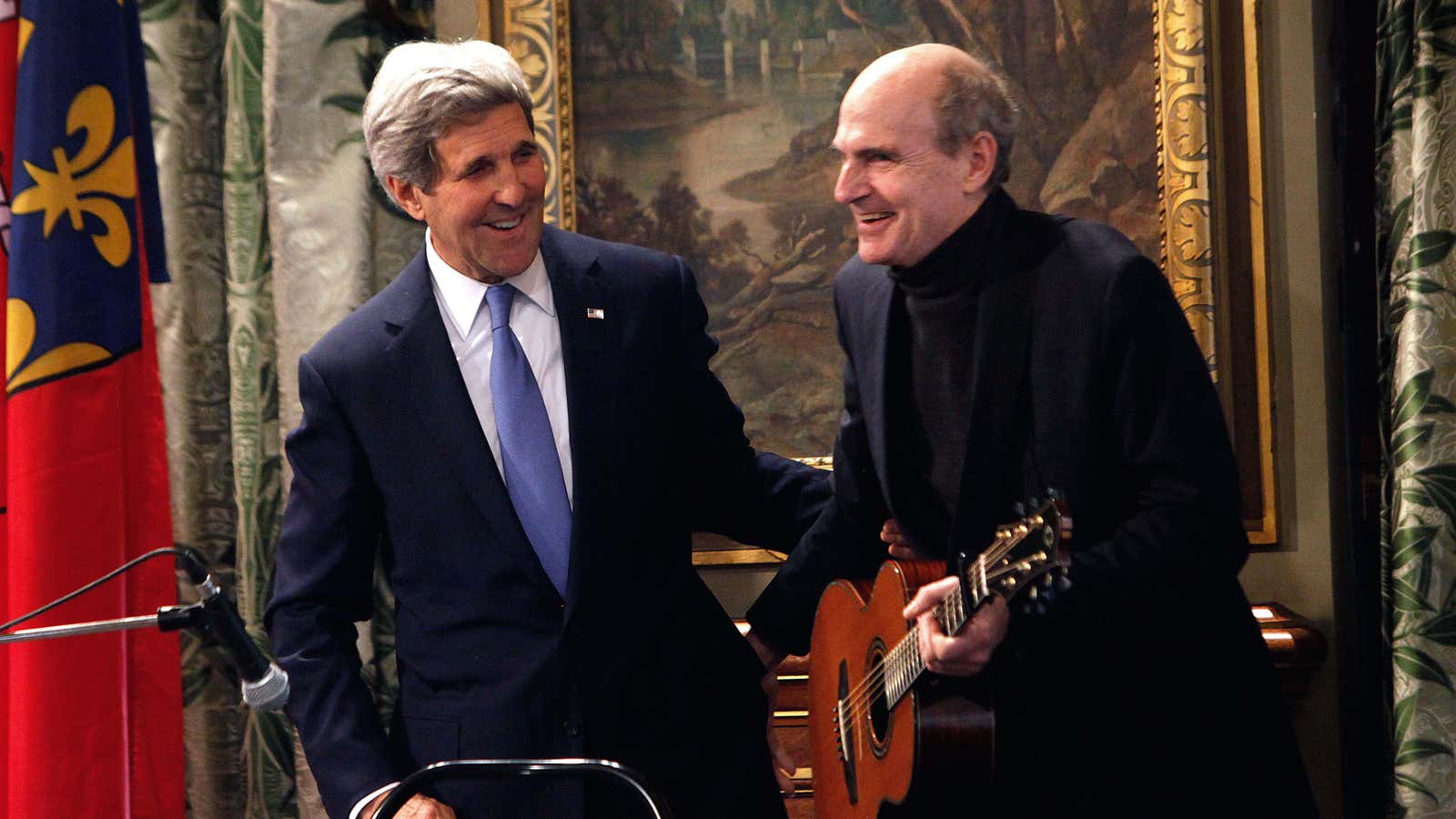Musical performances have become an inevitable part of national responses to terrorism. On Friday (Jan. 16), US secretary of State John Kerry brought James Taylor with him to Paris to sing Carole King’s “You’ve Got a Friend” to the French, and was widely ridiculed.
Kerry’s move seemed not just late, coming five days after the US had failed to send a high-level delegate to the anti-terrorism march of world leaders in Paris, but also out of step. Three days earlier, the French parliament had spontaneously performed “La Marseillaise” after a minute’s silence for the victims of the Charlie Hebdo and kosher-grocery-store massacres. That seemed to echo the moment on September 11, 2001, when members of the US Congress gathered on the steps of the Capitol and sang an impromptu rendition of “God Bless America.” Shortly afterward, musicians mobilized for a telethon that closed with Willie Nelson (who had not yet become a 9-11 Truther) singing “America the Beautiful.”
The choice of song is an unparalleled way to signal the scale and scope of an event—as the self-same Willie Nelson demonstrated in the 1997 movie Wag the Dog, in which a group of US officials cook up a fake war with Albania to get the president re-elected. In the movie Nelson conducts the performance of a song called “American Dream,” which casts the war as necessary to “guard our American borders” and “our American freedom.” Five years after the movie came out, president George W. Bush told Americans that these are precisely the things the terrorists want to destroy.
The stupefying power of modern terrorism, particularly as it has been interpreted since 9/11, is the ability of small bands of outsiders to declare war on entire nations. “For reasons not totally understood, a little bit of terrorism goes a long way,” legal scholar and terrorism-policy expert Philip Heymann wrote in his 2003 book Terrorism, Freedom, and Security. “Even small-scale terrorism possesses an almost magical ability to produce fear, anxiety, anger, and a demand for vigorous action in a sizeable portion of a country’s population.” The largest modern movement to employ terrorist tactics, the Provisional IRA, writes Heymann, never numbered more than a few hundred armed men at one time—and yet “these small groups were able to reshape the domestic and foreign agendas of great governments even though the level of harm they threatened was very low and their means, with few exceptions, conventional.”
The success of an act of terrorism is most accurately measured by the reaction it provokes. The 9/11 attacks marked a high point for modern terrorism: The US reacted by declaring war. A great nation was changing not merely its agenda but its very understanding of itself in the world.
Since then the rhetoric—and music—of war have become the accepted and expected response to terrorism. “La Marseillaise” had not been heard in the National Assembly in nearly a century. At least part of the reason lies in the song’s bloodthirsty xenophobic lyrics:
To arms, citizens
Form your battalions
March, march
Let impure blood
Water our furrows
goes the refrain, and the rest of the song is populated with “hordes of slaves,” “tigers who pitilessly ripped out their mothers’ wombs,” and, for the good guys, “sacred patriotism.” In times of peace, many French citizens find these words cringe-worthy. Compelling politicians of all stripes to sing them while standing shoulder to shoulder can be added to the list of the Parisian gunmens’ frightful achievements—as can the spectacle of many of the world’s leaders marching in formation in the streets of Paris.
This was why, to many, John Kerry’s offering seemed so tone-deaf. While France was still echoing with a song of war, James Taylor was crooning, “When you are down and troubled and you need a helping hand / And nothing, whoa, nothing is going right,” and so on, all about friends and feelings and not a word about blood or even a country name.
But this is precisely why Kerry’s gesture should be hailed. That song, along with Kerry’s awkwardly proffered hugs, was nothing short of a revolutionary break with the rhetoric of the War on Terror that the US initiated in 2001. More than a peace offering after snubbing the French by not showing up for the march, it ought to be viewed as an offer of peace—a way of reacting to loss and aggression without letting it get the upper hand.
All together now:
People can be so cold.
They’ll hurt you and desert you.
Well, they’ll take your soul if you let them,
Oh yeah, but don’t you let them.
